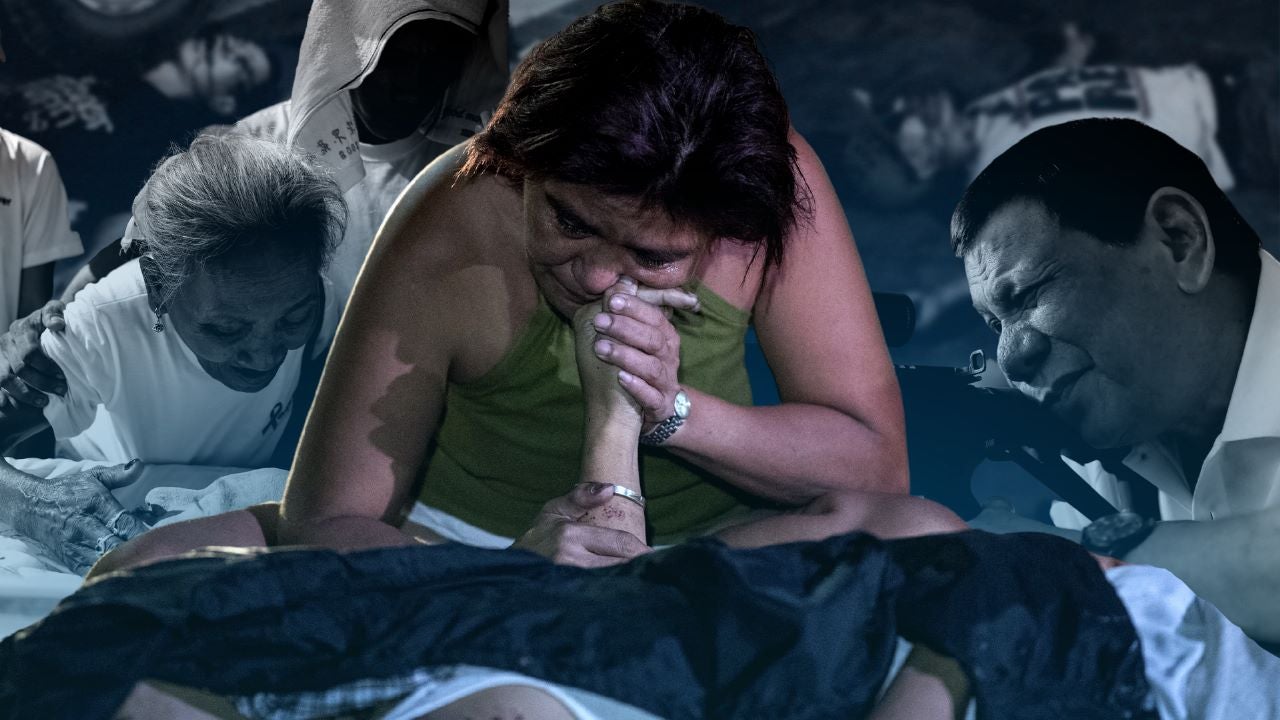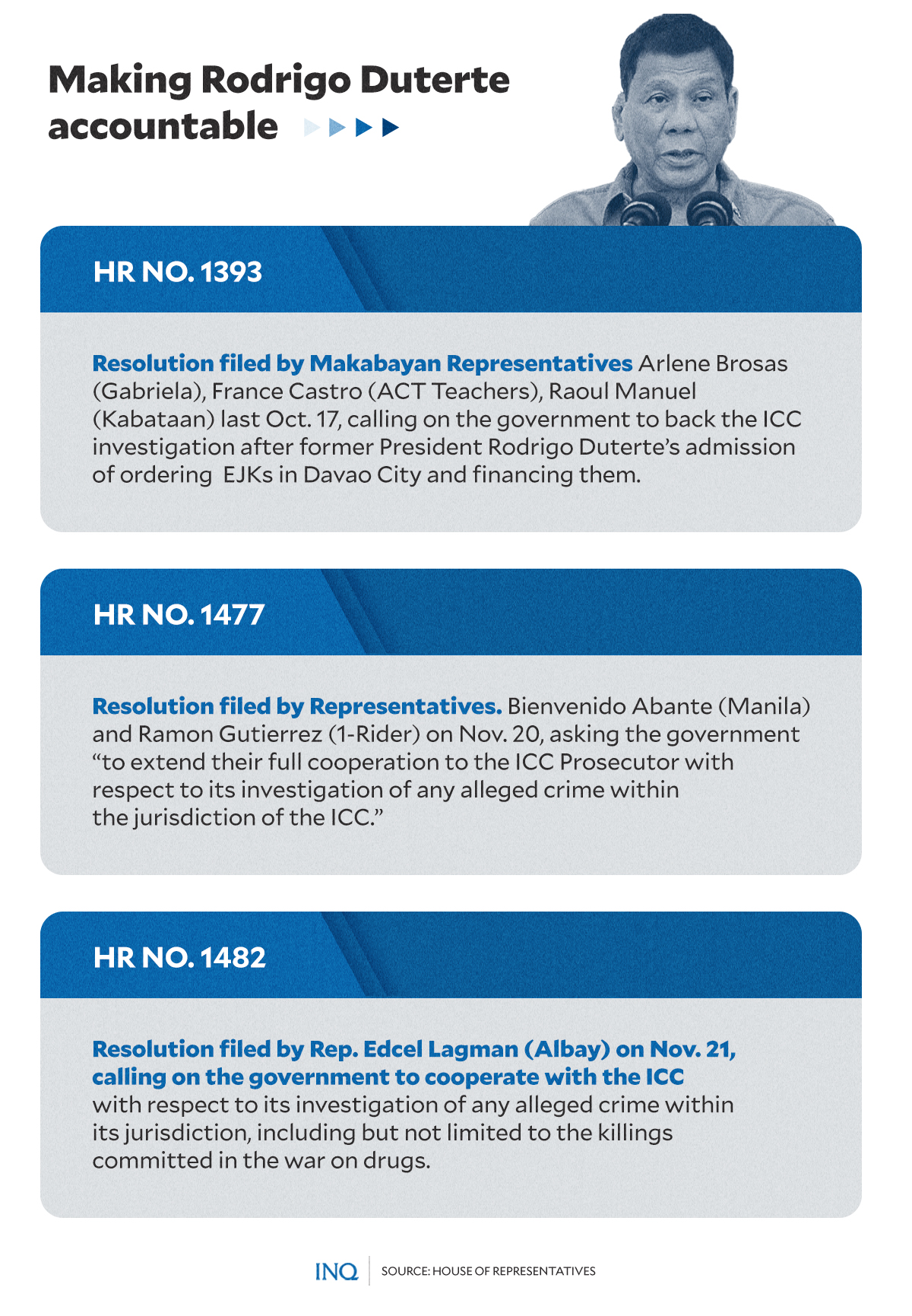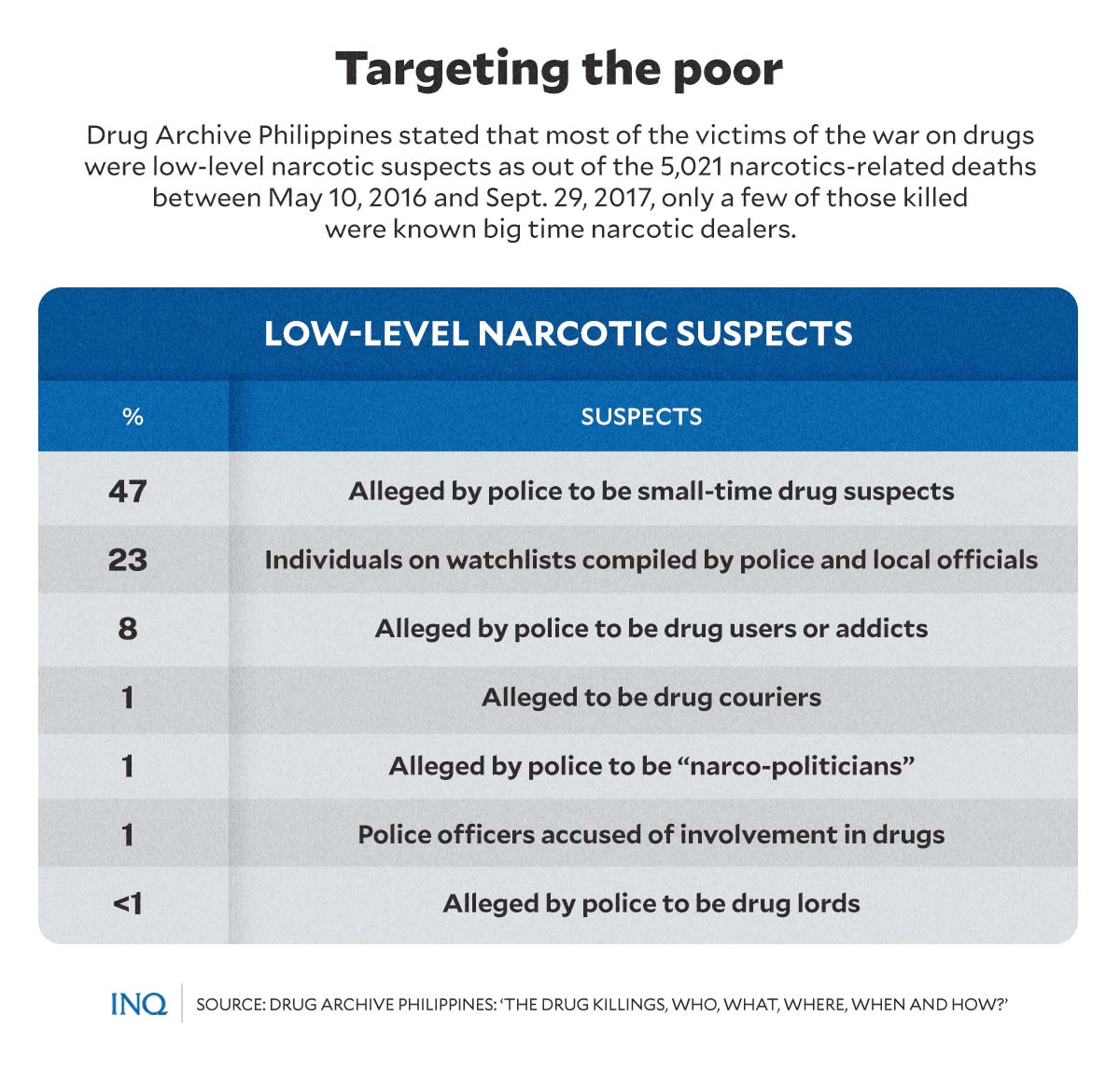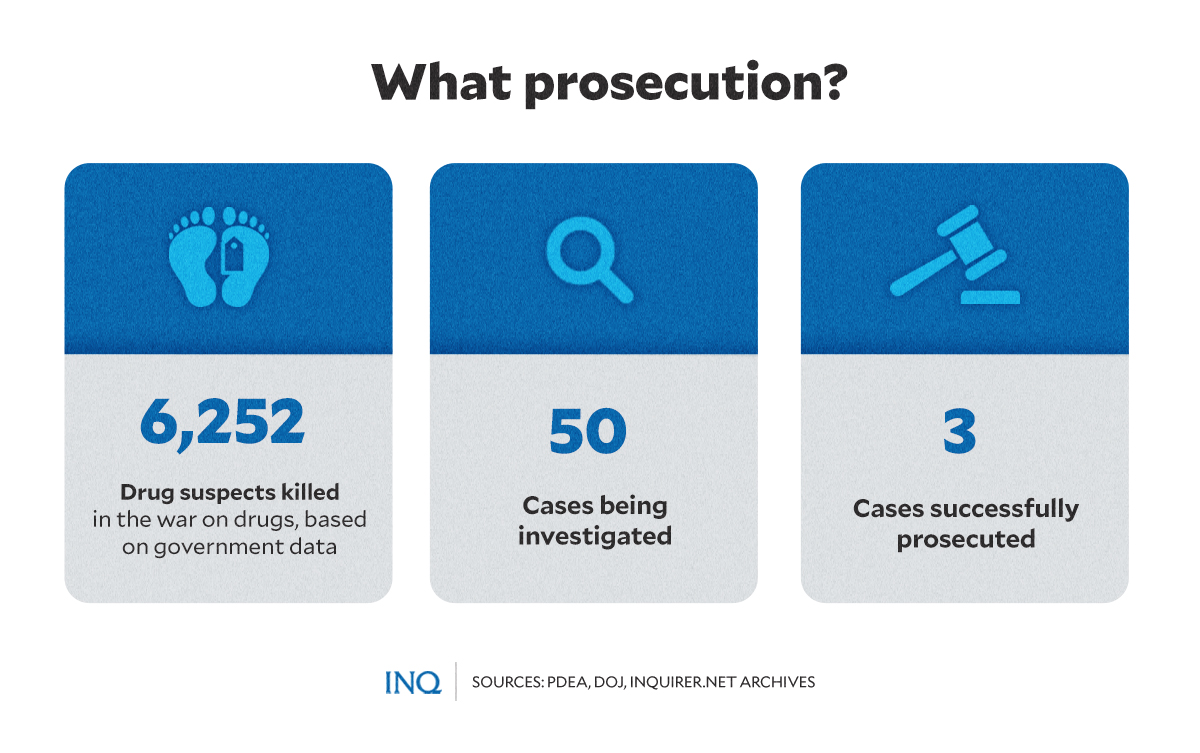Rejoining ICC: Letting light shine on darkness of Duterte’s anti-drug killings
MANILA, Philippines—The government was strong in its stand. “We are done with the ICC,” it said. But lawyers and families of the victims of Rodrigo Duterte’s murderous campaign against drugs never lost hope, clinging to these words: “A lot of things can change.”
This year, as the ICC, or the International Criminal Court, denied the attempt to block the investigation on the killings that were the hallmark of Duterte’s anti-drug campaign from 2011 to 2019, President Ferdinand “Bongbong” Marcos Jr. said the government would already disengage from the ICC.
But last month, while Marcos pointed out that the ICC has no jurisdiction to conduct an investigation, proposals for the Philippines to return to the ICC fold five years after Duterte cut it are now being considered.
READ: Bringing perpetrators to justice: The extent of what the ICC can do
This, as lawmakers from both the House of Representatives and the Senate filed resolutions calling on the government to cooperate with the ICC to investigate crimes within its jurisdiction.
Article continues after this advertisementThe ICC has jurisdiction over individuals who bear criminal responsibility for the most heinous crimes of concern to the international community—war crimes, crimes against humanity, genocide, and crimes of aggression.
Article continues after this advertisementThe resolutions from the House were already adopted on Nov. 29 by the Committees on Human Rights and Justice, which are now coordinating with Sen. Risa Hontiveros “so that we could transform our respective resolutions to a concurrent resolution.”
Marcos, however, pointed out that “as I have always said, there are still some problems when it comes to jurisdiction and sovereignty.” He said “now, if you can address those problems, then that would be something else.”
Light in the dark
For lawyer Dino de Leon, spokesperson of former Sen. Leila de Lima, who was one of the critics of former President Rodrigo Duterte’s drug war, the consideration of proposals to return to the fold of the ICC is already a headway.
Why?
He told INQUIRER.net via Messenger call that discussions on whether the Philippines should sign the Rome Statute again indicate that cooperation with the ICC prosecution is also being considered.
“That is a logical implication,” he said, explaining that when the government evaluates if it is good to return to ICC and that it was the correct thing to do, “it is also a good idea to be consistent with that principle.”
RELATED STORY: Justice for the dead in Duterte drug war hangs as gov’t seeks to shut ICC down
He said “that is to say that you will once again evaluate whether you will cooperate.”
De Leon stressed that the moment the Philippines rejoins the ICC, it is already bound by the mechanisms of the Tribunal, and as a state party to the Rome Statute, it has the responsibility to enforce a warrant of arrest issued by the ICC.
As explained by the ICC, once evidence is gathered and the suspect is identified, the prosecution will request ICC judges to issue an arrest warrant or a summons to appear to ensure that the person will face trial.
To issue a warrant, the ICC magistrates must be satisfied that there are reasonable grounds to believe that the suspect has committed a crime within its jurisdiction. The person must appear because, if not, the trial cannot occur as “trial in absentia” is prohibited.
Impunity in display
According to government data, 6,252 people had been killed during Duterte’s murderous campaign against drugs, most of the victims being from the ranks of the poorest of the poor.
READ: 6,252 drug suspects killed as of May 31 – PDEA
But human rights groups contest the numbers, saying the deaths could be as high as 30,000, including those killed in gangland-style street executions without cases being filed to prosecute the killers.
As pointed out in the Drug Archive Philippines, a research consortium initiative, a lot of the 5,021 drug-related deaths compiled by the Ateneo Policy Center from May 10, 2016 to Sept. 29, 2017 were poor.
The police alleged some 47 percent to be small-time drug suspects, 23 percent were individuals on watchlists prepared by police and local officials without much evidence, and eight percent were said to be drug users or addicts.
The rest were those alleged as drug couriers, “narco-politicians,” police officers accused of involvement in illegal drugs, and individuals alleged by the police as drug lords.
According to data from the Drug Archive Philippines, most of the dead were killed at home (24 percent), or their bodies were found on the streets (27 percent). Some nine percent were killed or found dead in a vehicle.
But in an attempt to assert that the government is taking action to bring justice to the victims, the Department of Justice (DOJ) said that 50 of the 6,252 cases were already being investigated. However, only three cases have been successfully prosecuted to date.
These were the cases of Kian delos Santos, Carl Angelo Arnaiz, and Reynaldo de Guzman.
Lawyers and families of the victims of Duterte’s anti-drug campaign have already said that the road to accountability is “long and winding,” with lawyer Kristina Conti, assisting counsel for the victim’s families, saying that they will never lose hope.
‘Desirable but not critical’
For De Leon, while Marcos expressed non-cooperation with the ICC over its investigation of the drug-related killings, the statement from the Bureau of Immigration (BI) that there is no ban against ICC investigators is “some sort of cooperation.”
READ: Hope flickers for victims as ICC to resume investigating Duterte drug war
He pointed out that cooperation from the government is “desirable but not critical,” especially since the ICC already recognized the reality that governments that were, in the first place, behind the heinous crimes would not cooperate anyway.
As Solicitor General Menardo Guevarra explained, ICC investigators can enter the Philippines provided they have the needed travel documents. He said the permission will come from the DOJ and BI.
Essentially, this indicates that investigators from the ICC are “free to come,” De Leon said. “It’s just that they cannot expect cooperation from the government.” He stressed, however, that the ICC “does not need perfect cooperation.”
“All they need is for them to be allowed to gather evidence and to do their work without the risk of arrest,” he said, citing Duterte’s previous threat against an ICC prosecutor—that should Fatou Bensouda come to the Philippines, “I will arrest you.”
RELATED STORY: PH return to ICC: Debate swirls around whether Senate OK needed again
For Vice President Sara Duterte, however, while she respects Marcos’ decision to look into proposals of having the Philippines re-enter the Rome Statute again, her office will continue to assert its stand against cooperating with the ICC investigation.
“We will lay down the legal basis,” said the former ruler’s daughter.
Less difficult for ICC
The Supreme Court already decided that based on the Rome Statute, “a State shall not be discharged, by reason of its withdrawal, from the obligations arising from this Statute while it was a Party to the Statute.”
As stressed by the New York-based Human Rights Watch, “securing arrests is one of the ICC’s most difficult challenges” because, without its own police force, the ICC has to rely on state parties and the international community to assist in arrests.
So, with the Philippines’ withdrawal from the Rome Statute, individuals deemed responsible for the killings in the context of Duterte’s campaign against drugs may be safe from arrest “as long as they will stay inside the country.”
But considering returning to the ICC fold, things could be less difficult, with De Leon saying that returning to the ICC “means that the Philippines believes in the Tribunal’s mechanisms.”
“Of course, the Philippines can refuse [to enforce a warrant of arrest], but this will be actually violative of the very treaty that it rejoined,” he said, explaining that the Philippines “cannot be selective.”
De Leon pointed out that should the Philippines sign the Rome Statute again, “it is already bound by the rules of the ICC and has the duty to implement a warrant of arrest in case one is issued.”
He explained that “it would be wise for the Philippines to make sure that it does its duty based on the treaties that it entered into” because if not, there are serious consequences.
The Philippines could be in breach of its obligations to the international community, he said, so the Philippines will be considered a party that is not holding its end of the bargain.
RELATED STORY: Drug war victims’ families welcome review of ICC exit



